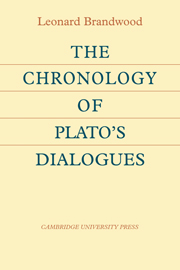Book contents
- Frontmatter
- Contents
- Preface
- 1 Introduction
- 2 L. CAMPBELL
- 3 F. BLASS
- 4 W. DITTENBERGER
- 5 A. FREDERKING
- 6 F. KUGLER
- 7 M. SCHANZ
- 8 E. WALBE
- 9 H. SIEBECK
- 10 C. RITTER (I)
- 11 J. TIEMANN
- 12 G. B. HUSSEY
- 13 H. VON ARNIM (I)
- 14 CH. BARON
- 15 W. LUTOSLAWSKI
- 16 P. NATORP
- 17 G. JANELL
- 18 W. KALUSCHA AND L. BILLIG
- 19 H. VON ARNIM (II)
- 20 C. RITTER (II)
- 21 A. DÍAZ TEJERA
- 22 D. WISHART AND S. V. LEACH
- 23 Conclusion
- Indexes
4 - W. DITTENBERGER
Published online by Cambridge University Press: 07 September 2010
- Frontmatter
- Contents
- Preface
- 1 Introduction
- 2 L. CAMPBELL
- 3 F. BLASS
- 4 W. DITTENBERGER
- 5 A. FREDERKING
- 6 F. KUGLER
- 7 M. SCHANZ
- 8 E. WALBE
- 9 H. SIEBECK
- 10 C. RITTER (I)
- 11 J. TIEMANN
- 12 G. B. HUSSEY
- 13 H. VON ARNIM (I)
- 14 CH. BARON
- 15 W. LUTOSLAWSKI
- 16 P. NATORP
- 17 G. JANELL
- 18 W. KALUSCHA AND L. BILLIG
- 19 H. VON ARNIM (II)
- 20 C. RITTER (II)
- 21 A. DÍAZ TEJERA
- 22 D. WISHART AND S. V. LEACH
- 23 Conclusion
- Indexes
Summary
The scholar universally regarded in Germany as the founder of the stylistic method until as late as 1896 was W. Dittenberger. His first and most important criterion was the particle. After excluding the three usages ἦ μήν, οὐδὲ μήν, and οὐ μήν on the ground that they occur too rarely to be of any value, he found that there remained five others which by their frequency in the various dialogues provided the possibility of discerning a diversity in Plato's manner of writing. These were καὶ μήν ἀλλὰ μήν, τὶ μὴν; γε μήν and ἀλλὰ … μήν. Their occurrences are set out in Table 4.1 (p. 12), Apol., Tim. and Crit. being omitted by him on account of their deficiency in dialogue form.
Dittenberger called attention to the striking difference in the use of the first two and last three particle combinations. The former occur in every dialogue except the very short Crito> while the latter are completely absent from the first eleven dialogues, appearing in all the rest including the Symp. and Lys. Particularly noteworthy is the fact that, apart from the fluctuation in these two works, the three particles are always either all present or all absent from a work. This effectively rules out any notion of chance being the cause. Obviously, Dittenberger said, the fact must be accepted that Plato's language altered at this point, and so we can at once divide the twenty-one dialogues into two chronological groups, the later being indicated by the presence in it of the Laws.
- Type
- Chapter
- Information
- The Chronology of Plato's Dialogues , pp. 11 - 22Publisher: Cambridge University PressPrint publication year: 1990



